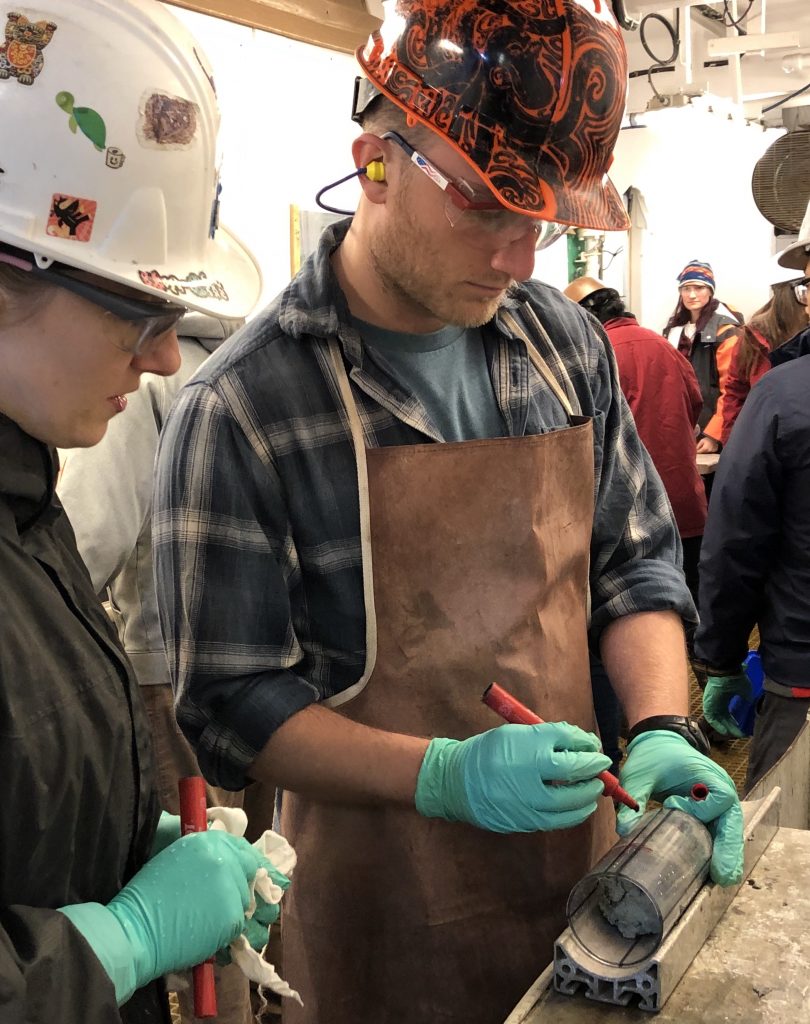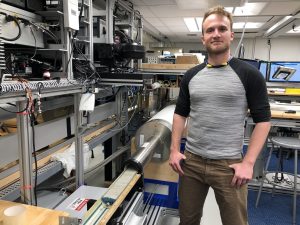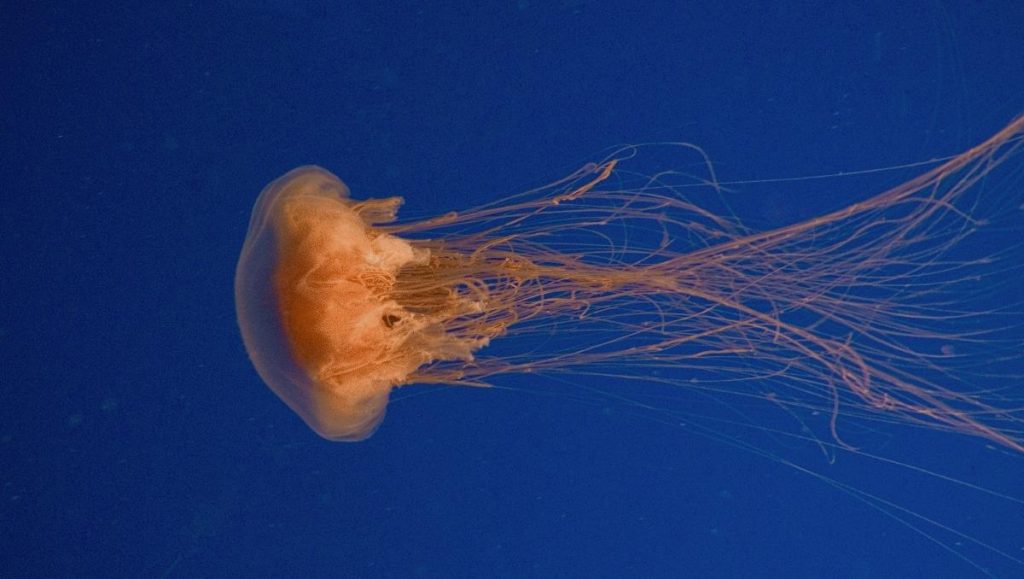
Career Spotlight: Paleomagnetism Technician Skyler Jordan

-Worked on the JR before: No
Skyler Jordan Interview
Please describe your job duties while on the JR. What will you be doing on a daily basis?
-
-
-
-
-
-
-
-
- I am assisting with core recovery when the drill is active. I am also responsible for supporting the paleomagnetism lab by retrieving necessary supplies, assisting the scientists with operating the machinery, and caring for the lab space. When not performing those tasks, I help with general tasks around the ship.
-
-
-
-
-
-
-
Describe one instrument or tool that is essential for you to do your job? Or a piece of equipment on the JR that is useful and why – what does it do?
-
-
-
-
-
-
-
-
- I am the Paleomagnetism Technician, so my main instrument is the Superconducting Rock Magnetometer. It sounds complicated, and it kind of is! The SRM, as we call it, uses super-cooled helium (cooled down to a temperature of 4 Kelvin – that’s -269.15℃, or -452.47℉!) to generate magnetic fields. Some rocks have magnetic materials, like iron, which record the state of Earth’s magnetic field in the past. With the SRM, we can gradually demagnetize a sample of rock, which can reveal that information. This allows us to determine the age of a particular rock, and understand how the magnetic field has changed over time.
-
-
-
-
-
-
-

Why is your work (or research) important? What question are you trying to answer or how does your work/research help assist/advance scientific knowledge?
- I don’t do the scientific research myself, but I do support the scientists and, hopefully, create an environment where they can do their work. Paleomagnetism is used for a variety of purposes, including determining the age of a rock sample, so it can be important to ensure we can draw conclusions about a particular period of time.
Why the ocean? What made you choose a career at sea or career that involves the ocean?
- I enjoy scientific field work, and have been working in that general area since I graduated college. Recently I’ve begun graduate school, studying for a Master’s of Oceanography at the University of Rhode Island. While I don’t have much interest in being a scientist, I really enjoy supporting scientific field work and getting my hands dirty. The appeal of exploration is there as well – the ocean is so poorly studied and it’s exciting to be involved in learning about something so big and important that we don’t understand.
What are you most excited about for this expedition and/or being on the JR?
- While I do have experience in remote areas for long periods of time, I’ve never been on a ship for this long before. I’m curious about what that experience will be like, especially on seas as rough as the Southern Ocean can be. Technical work in support of scientific research is something I’d consider as a career, so I’m excited to see what working in that field is like aboard the JR. Other than that, I’ve been hoping to see some wildlife, when it isn’t incredibly dark – this week I saw two Wandering Albatrosses flying right near our stern, such beautiful birds! If we’re lucky, maybe whales will show up. I’ve never been this far south, and I always like to keep an eye out for wildlife in new places.
What are three things you think are needed for a successful expedition at sea? And Why!
- A friendly crew. When you’re stuck with your coworkers for two months on a ship, there’s no escape. It can be difficult – people might rub each other the wrong way on accident, personalities and priorities clash. Being flexible and very understanding is vital. Always be willing to give someone the benefit of the doubt. With a small group like this, it’s important to pull your weight and support your teammates.
- Good food. A hungry crew is a cranky crew, so keeping morale up with meals and snacks is a must.
- The ability to find space on your own. Whether by going to the gym, listening to music, reading, or going outside, everyone needs a break now and then.
If you could answer one question about our Earth – what would it be and why?
- How life originated! Evolution can tell us how life diversified, but it doesn’t say much about origins. Based on several experiments, it seems that it doesn’t necessarily take much for basic life forms to get going – just some amino acids, some energy, things that would have been available on a pre-life Earth. Understanding the very beginnings of life might give us clues as to where to look for more of it. Which planets seem most able to support life? We can make guesses, but the answering how life originated would give us vastly more information about the universe.
What is your favorite sea creature and why?
- That’s an impossible question to answer! Obviously, there’s lots of cool ones that anyone can think of – whales, octopi, sharks, turtles, sea lions, penguins. I’m very tempted to say the giant squid. It’s hard to believe, but until the last 10 years or so, no one had ever seen a living giant squid! Only dead ones that washed up on the beach. But that also seems too obvious. Just to be different, then, I’ll go for the Lion’s Mane Jellyfish, the biggest jellyfish in the world. They’re huge and mysterious and really capture the unknowable majesty of the ocean.

When did you know you wanted to pursue a career in science or an ocean science career?
- I’ve been interested in science since I was a very small kid, when I was passionate about dinosaurs. My interest in the ocean sciences specifically came later, when I was considering what sort of science I’d like to pursue. I realized that my ideal career would be a Star Fleet officer (from Star Trek), flying around the galaxy to explore strange new worlds. Studying the ocean felt quite a lot like exploring another planet to me, except the strange new world I get to explore is our own.
What do you personally hope to gain or experience while on EXP383?
- In addition to going to a new place, I’ve never done a job like this before, and since I’m interested in this sort of thing as a career, I’m hoping to gain the skills I need to be able to do this job well!
What message do you have for anyone considering a career at sea or a career involving the ocean sciences?
- Jump in and try it. It can be hard to get your foot in the door, but there are lots of ways to go to sea. Just look at the JR – we’ve got everything from mechanics and computer scientists to geologists, cooks, drill technicians, crew, and a doctor. Keep a broad skillset and be willing to try and learn lots of different things.
What do you do back home when not on the JR?
- I’m a graduate student at the University of Rhode Island, so I take classes there. I’m on the rowing team, so I get up early every morning to train, which I really enjoy. I like music, theater, and drawing, although I don’t have as much time for those as I wish I did. When I’m not doing homework, I can be found playing Dungeons and Dragons with my friends – it’s a great hobby and it helps me keep in touch with people who live far away.
Do you get sea sick? If yes or sometimes, please also select the other tab and describe how you cope with it.
- Yes: Mostly I need time to acclimate. Sometimes it helps to lie down with my eyes closed until I can equilibrate. I have brought along seasickness pills, as well. But it helps to be busy.
The need for space comes in many forms. Which type of space, in general, is the most important to you?
- ___Personal Space
- ___Creative Space
- _X__Outdoor Space
- ___Emotional Space
- ___Physical Space
- ___Spiritual or Meditative
- ___Outer Space
- ___Community Space
- ___Quite Space
- ___Productive/Work Space
- ___Digital/Virtual Space
- ___Public Space
- ___Inner Space
- ___Other:
Why that type of space? What makes it important to you and will it be available while on the JR?
- I love being outside, in nature, whether that’s going in a walk in a park or hiking through mountains. As we humans impact more and more of the world, through climate change, deforestation, and development, it’s harder and harder to find natural spaces. I think it’s tragic that we’re losing those places – and for what? Short-term financial gain? We’re destroying the planet to make money. So it’s important to me to get out into those places while they’re still there. Out here on the JR, it’s difficult to say whether I’ll have much access to outdoor space. Obviously, we’re in some of the most remote oceans in the world, and whenever I want I can go out on the decks and watch the ocean. But we’re also confined to this ship, surrounded by an inaccessible and potentially dangerous environment. Kind of like being up in the International Space Station. So in a sense, yes, it will be available, and in a sense, no, it won’t. I’ll just have to go on a good hike when I get home!